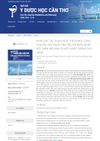11 citations,
December 2017 in “Orphanet Journal of Rare Diseases” A new mutation in the ST14 gene broadens the understanding of ichthyosis-hypotrichosis syndrome.
 8 citations,
April 2022 in “The journal of investigative dermatology/Journal of investigative dermatology”
8 citations,
April 2022 in “The journal of investigative dermatology/Journal of investigative dermatology” Certain genetic changes in the LSS gene cause a rare skin and hair condition.
 8 citations,
July 2021 in “Patient Preference and Adherence”
8 citations,
July 2021 in “Patient Preference and Adherence” Alopecia treatments improve life quality but side effects can lessen this benefit; better use of quality of life measures is needed.
 6 citations,
May 2023 in “Drugs”
6 citations,
May 2023 in “Drugs” Baricitinib helps regrow hair in adults with severe alopecia better than a placebo and is approved for treatment, but long-term effects are still unknown.
6 citations,
September 2021 in “Autophagy” Autophagy prevents early aging and maintains lipid and pheromone balance in mouse glands.
 4 citations,
November 2022 in “Frontiers in Medicine”
4 citations,
November 2022 in “Frontiers in Medicine” People with alopecia areata are more likely to have anxiety and depression and a lower quality of life.
4 citations,
July 2017 in “Journal of Medical Case Reports” The 2012 criteria are better for diagnosing atypical lupus cases.
 3 citations,
February 2022 in “Frontiers in Genetics”
3 citations,
February 2022 in “Frontiers in Genetics” The LncRNA AC010789.1 slows down hair loss by promoting hair follicle growth and interacting with miR-21 and the Wnt/β-catenin pathway.
3 citations,
May 2021 in “PloS one” Many men misuse oral contraceptive pills for things like hair growth and muscle gain.
2 citations,
June 2024 in “Journal of Clinical Medicine” Alopecia Areata can affect nails, often improving on its own, but JAK inhibitors may help.
 1 citations,
September 2023 in “Dermatology and Therapy”
1 citations,
September 2023 in “Dermatology and Therapy” Baricitinib helps improve hair growth in severe alopecia, with better results in less severe cases and higher doses working faster.
 February 2025 in “Healthcare”
February 2025 in “Healthcare” Caffeine may help with hair loss, but more research is needed.
 January 2025 in “Journal of Cutaneous Immunology and Allergy”
January 2025 in “Journal of Cutaneous Immunology and Allergy” Baricitinib is effective for treating severe alopecia areata in Japanese patients, but long-term safety needs more study.
 December 2024 in “Pakistan Armed Forces Medical Journal”
December 2024 in “Pakistan Armed Forces Medical Journal” PRP is more effective than Minoxidil for treating alopecia areata.
 December 2024 in “Frontiers in Pharmacology”
December 2024 in “Frontiers in Pharmacology” Araliadiol may promote hair growth like minoxidil without being toxic.
 October 2024 in “Frontiers in Veterinary Science”
October 2024 in “Frontiers in Veterinary Science” FKBP10 and FBN2 are key proteins for hair growth in cashmere goats.
 August 2024 in “Frontiers in Public Health”
August 2024 in “Frontiers in Public Health” Alopecia Areata severely impacts mental health, causing anxiety and depression, affecting quality of life.

Combining PRP with Tressfix Serum is more effective for hair regrowth in telogen effluvium than using either alone.
 April 2024 in “Nano research”
April 2024 in “Nano research” Minoxidil patches and cold plasma may help treat hair loss.
 March 2024 in “Cell communication and signaling”
March 2024 in “Cell communication and signaling” Lack of sleep in mice leads to prostatitis by reducing certain hormones and activating an inflammatory pathway, which can be temporarily fixed with normal sleep.
 February 2024 in “The Open dermatology journal”
February 2024 in “The Open dermatology journal” Alopecia Areata affects people of all ages worldwide, is likely caused by genetic and environmental factors, and can lead to stress and depression, highlighting the need for treatments that address both physical and mental health.
 November 2023 in “Dermatology and Therapy”
November 2023 in “Dermatology and Therapy” Baricitinib treatment helps regrow eyebrow, eyelash, and scalp hair in severe alopecia areata, improving patients' emotional well-being and quality of life.
September 2023 in “Animals” Genes linked to wool fineness in sheep have been identified.
August 2023 in “Fermentation” Scientists can use engineered microbes to make L-aspartate and related chemicals, but there's still room to improve their efficiency.
 May 2023 in “Tạp chí Y Dược học Cần Thơ”
May 2023 in “Tạp chí Y Dược học Cần Thơ” The shampoo with grapefruit peel and Gleditsia sinensis helps mice grow hair faster, more, and longer.
 May 2023 in “Journal of managed care & specialty pharmacy”
May 2023 in “Journal of managed care & specialty pharmacy” Alopecia areata causes hair loss and life quality issues; current treatments are often unsatisfactory, but new drugs like JAK inhibitors show promise.
 December 2022 in “Dermatology and Therapy”
December 2022 in “Dermatology and Therapy” Alopecia areata needs more recognition and better treatment access in Latin America to improve patient care and outcomes.
 June 2022 in “Frontiers in Immunology”
June 2022 in “Frontiers in Immunology” Tofacitinib regrew hair in a man with total hair loss but raised cytokine levels, needing more research on possible side effects.
 January 2020 in “Journal of Clinical Biochemistry and Nutrition”
January 2020 in “Journal of Clinical Biochemistry and Nutrition” Low zinc levels in chronic liver disease patients are linked to more severe symptoms like taste issues and skin problems, and zinc supplements might help.





















